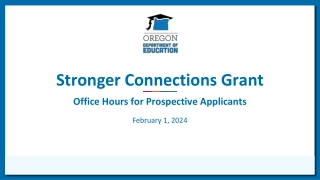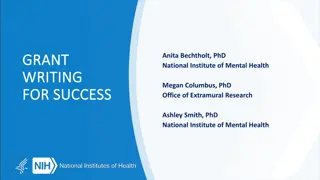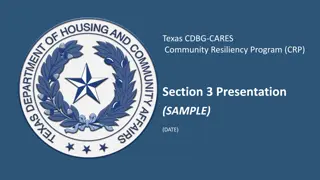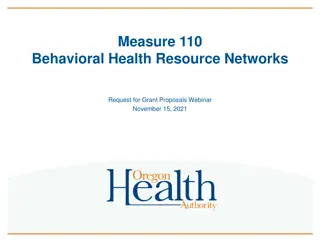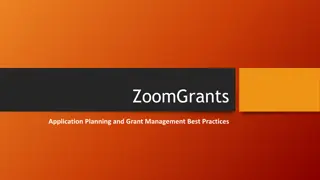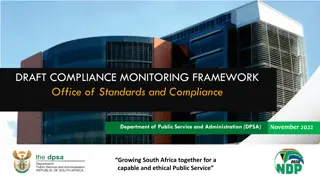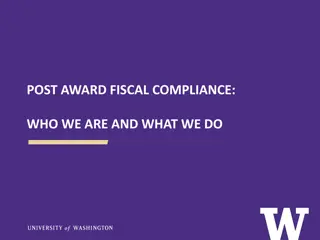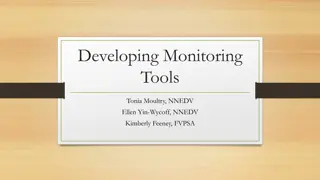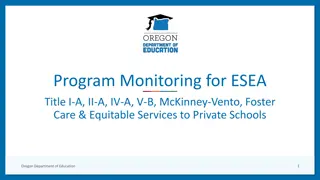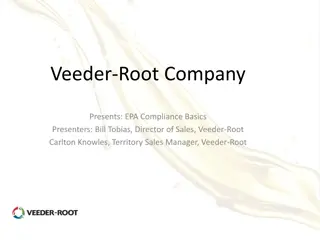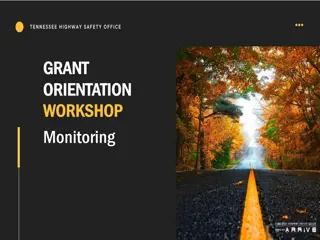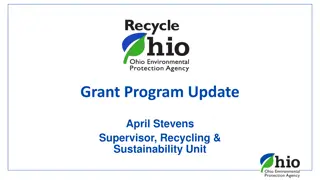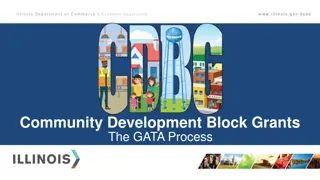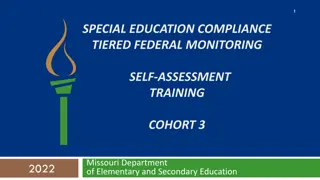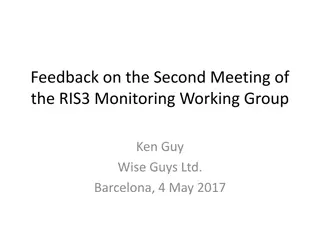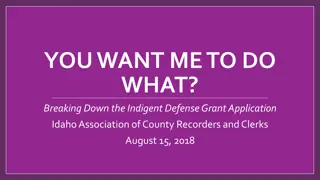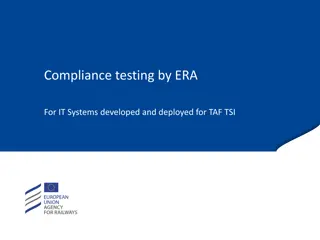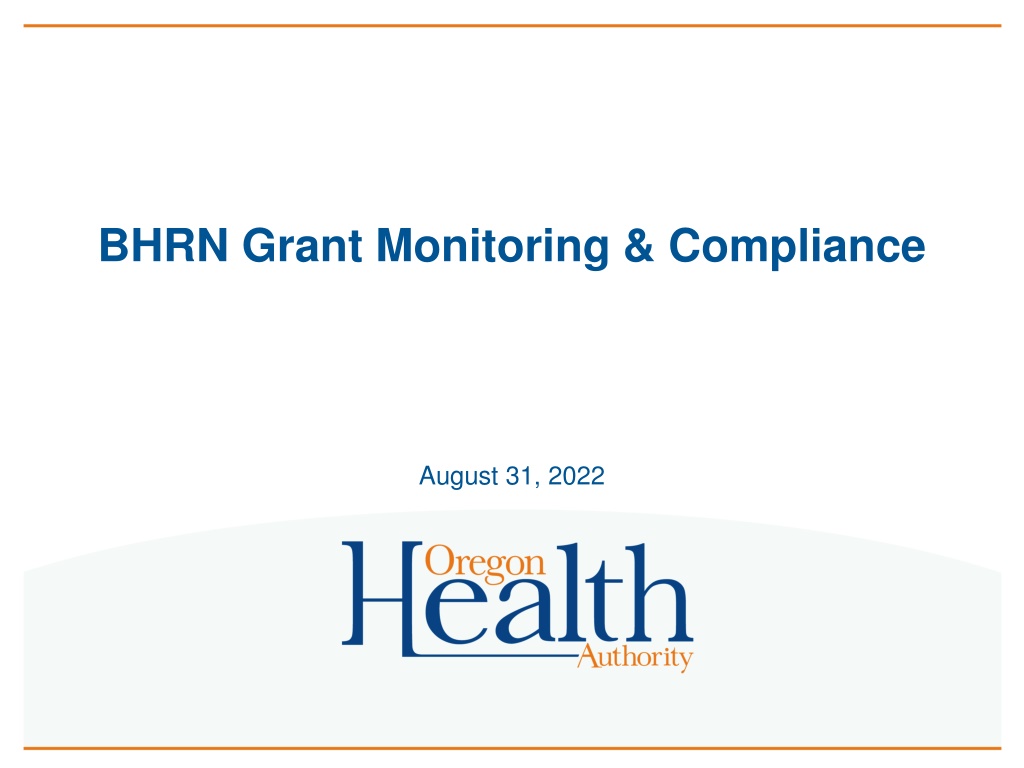
Grant Monitoring, Compliance, and Oversight Procedures
Learn about the essential procedures for overseeing grantees' performance, including reviewing financial and service delivery data, reporting requirements, financial reporting, and submission of policies and procedures to ensure culturally responsive and inclusive services are provided.
Download Presentation

Please find below an Image/Link to download the presentation.
The content on the website is provided AS IS for your information and personal use only. It may not be sold, licensed, or shared on other websites without obtaining consent from the author. Download presentation by click this link. If you encounter any issues during the download, it is possible that the publisher has removed the file from their server.
E N D
Presentation Transcript
BHRN Grant Monitoring & Compliance August 31, 2022
M110 Next Phase: Overseeing Grantees In accordance with statute and rule, the OAC has responsibility and authority to oversee grantee performance. This will be done through: Review of Financial Data Review of Service Delivery Data Requiring Submission of Policies Additional information may be available to the OAC through: Secretary of State Audit Reports Consumer or other complaints Regulatory activity for providers certified or licensed by OHA 2
Grantee Data Reporting Phased data reporting Phase 1: Includes # of client served, # services provided, # of denials Phase 2: Same as phase 1 but with REALD+SOGI data Phase 3: Includes data on client outcomes, service denials and delays, wait times, duration of services OHA will review data, report periodically to OAC Based on data reported, OAC could direct OHA to do follow-up with grantee 3
Grantee Financial Reporting Quarterly expenditure reporting is required. Grantees will report: Expenditures by budget category (personnel, training, services and supplies, capital equipment, administrative) Expenditures by service area: Screening and comprehensive BH needs assessment Intervention planning Low barrier SUD Peer support, mentoring, etc Housing Services Harm reduction Supported employment Mobile or virtual outreach services 4
Submission of Policies and Procedures Grantees must submit their policies and procedures to OHA/OAC that detail how they will provide: Culturally and Linguistically Specific Services; Culturally and Linguistically Responsive Services; Accessibility for People with Intellectual and Developmental Disabilities; Accessibility for People with Physical Disabilities; Gender Affirming and Responsive Care; LGBTQIA2S+ Affirming and Inclusive Services; Youth Friendly and Inclusive Services; Patient Centered and Non-Stigmatizing Services, including on use of person-first, non-stigmatizing language; Trauma informed engagement and care; Services for parents or non-traditional parents with minor children; Services to pregnant persons (where applicable); BHRNs must also have procedures for required data collection. Having these policies and procedures in place will help to ensure that appropriate services are being provided. 5
Secretary of State Real-Time Audits Under state law, the Secretary of State (SOS) is required to do performance audits and financial reviews . Will look at how M. 110 funds are being used, effectiveness of the funding in achieving the policy objectives of M. 110. M. 110 grantees must keep accurate books, records and accounts those subject to inspection and audit by SOS. SOS audits will help inform OAC decisions on grantee monitoring. 6
Grantee Oversight by OHA Licensing & Certification If a grantee or its employees are licensed or certified by OHA, those OHA programs will follow-up on complaints, and do routine reviews under OHA s statutes and rules. Examples: Community health workers, peer wellness specialists, and peer support specialists are certified by OHA under OAR 410, Division 180 Outpatient substance use disorders treatment and recovery programs are certified by OHA under OAR 309, Division 19 7
Grantee Complaint Process OHA has a process for taking complaints. Complaints can be sent to: OHA.Measure110@dhsoha.state.or.us. Complaints related to grant compliance will go to grant administrator. Complaints related to licensure/certification, will go to those programs. Complaints unrelated to grant compliance or OHA licensure/certification, will be referred to appropriate other agency, if one can be identified (e.g. BOLI, OR-OSHA). OAC only has oversight related to its rules and terms of the grant agreement. 8
Grant Agreement Tools for Compliance OHA grant administrator can: Request information or records from the grantee. Request grantee cure a performance deficiency within 14 days. Send written demand to return grant funds spent in violation of the grant agreement ( mis-expended funds ) OAC can exercise remedies under the grant, for example: Withhold all or part of the funds that have not yet been paid Terminate the grant agreement File a legal action to collect damages, compel specific performance, or seek other relief OAC can terminate the grant agreement immediately in writing if it determines that there is a threat to the health, safety, or welfare. 9
Grant Administration OHA must ensure grantees comply with all applicable rules regulating the provision of behavioral health services. ORS 430.390(3). OHA staff are grant administrators. Common grant administrator functions: Ensure deadlines are met (data reporting, submission of insurance information) Ensure payments go out on time Ensuring reports are consistent with grant requirements (includes OAC rules) Provide grantee support If there is non-compliance, address the issue with grantee, work on performance improvement. If issue isn t addressed, escalate issue under grant terms. 10

